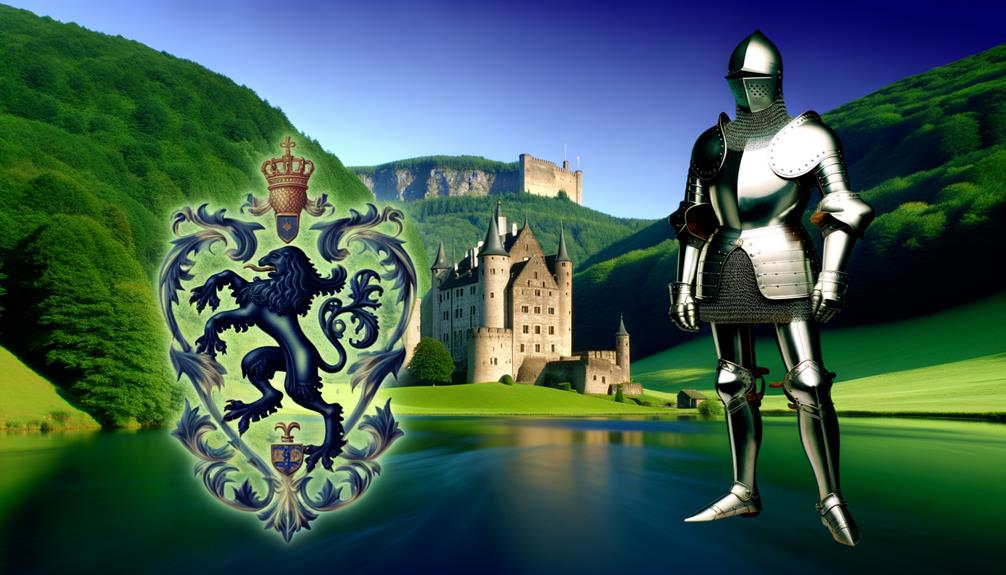Alan Name Meaning and Origin
The name Alan, rooted in Celtic and Breton origins, is often interpreted to mean 'handsome' or 'cheerful.' Its linguistic foundations trace back to Old Breton and Old Celtic languages, signifying harmony and nobility. Historically, the name prominently appears in medieval records, especially following the Norman Conquest with figures such as Alan Rufus.
The name has diversified globally with variations like Alain in France and Alán in Spain/Latin America, showcasing its adaptability. Renowned individuals such as Alan Turing and Alan Shepard have further cemented its legacy.
Discover more about the rich tapestry behind this timeless name.

Key Takeaways
- Alan means 'handsome' or 'cheerful' and has Celtic and Breton origins.
- The name has roots in Old Breton and Old Celtic languages.
- Historically significant, especially in the Norman Conquest with figures like Alan Rufus.
- Reflects values like harmony, nobility, and integrity in Celtic traditions.
- Variations include Alain in France, Alán in Spain, and Alen in Russia.
Meaning of Alan
The name Alan is commonly interpreted to mean 'handsome' or 'cheerful' and is believed to have Celtic and Breton origins.
This name, often associated with positive and appealing attributes, has linguistic roots in Old Breton and Old Celtic languages. The etymology suggests a rich cultural heritage, reflecting the values and aesthetics of the regions where it originated.
The Celtic influence points to a deep connection with ancient tribes known for their artistry and warrior ethos. Meanwhile, the Breton roots align with a distinct cultural identity in Northwestern France.
Both interpretations underscore a heritage that emphasizes favorable personal characteristics, resonating through generations and cultures. Understanding these linguistic and cultural dimensions provides a nuanced appreciation of the name Alan.
Historical Significance
Tracing its historical importance, the name Alan emerges prominently in medieval records, particularly in the context of the Norman Conquest and the establishment of Breton nobility in England.
Evidently, Alan Rufus, a close companion of William the Conqueror, played a pivotal role in the post-conquest consolidation of Norman power. Granted vast estates, Alan Rufus contributed to the socio-political landscape of Norman England, with Richmond Castle in North Yorkshire serving as a significant indication of his influence.
The name Alan also appears in various charters and legal documents, pointing to its prevalence among the ruling classes. This historical integration of the name underscores its association with nobility, valor, and territorial governance during a transformative period in English history.
Celtic Roots
Rooted deeply in Celtic culture, the name Alan derives from the ancient Gaelic word 'Ailín,' which signifies harmony and nobility. This name carries a profound historical resonance, reflecting the values and ethos of ancient Gaelic societies.
Its etymology speaks to qualities that were held in high regard among the Celts, such as balance, integrity, and social prestige.
- Harmony: The name suggests a sense of balance and concord, essential traits in Celtic traditions.
- Nobility: It reflects a lineage of leadership, emphasizing the importance of honor and moral integrity.
- Cultural Richness: Embodying centuries of historical context, it connects modern bearers with their ancestral heritage.
Thus, the name Alan is not merely a label but a tribute to a storied cultural legacy.
Global Variations
Building on its rich Celtic heritage, the name Alan has evolved through various cultures, resulting in diverse global variations that reflect linguistic and regional influences.
In France, the name appears as Alain, while in Spain and Latin America, it transforms into Alán. The Russian variant is Alen, and in Ireland, it often retains its original form but is sometimes spelled as Ailín.
Each adaptation showcases the name's ability to integrate seamlessly into different phonetic and cultural contexts. These variations not only highlight the name's widespread appeal but also its adaptability, allowing it to resonate with a broad spectrum of people globally.
Such diversity underscores the name Alan's enduring relevance across varying linguistic landscapes.
Famous Alans
Among the many notable individuals who bear the name, Alan Turing stands out as a pioneering mathematician and computer scientist whose work laid the groundwork for modern computing. Turing's profound contributions to the fields of artificial intelligence and cryptography have left an indelible mark on contemporary technology.
Another distinguished figure is Alan Shepard, the first American astronaut to travel into space, whose bravery and achievements have inspired generations.
Additionally, Alan Rickman, a versatile actor known for his iconic roles in film and theater, captivated audiences worldwide with his talent.
- Alan Turing: Revolutionized computing and artificial intelligence.
- Alan Shepard: Embodied courage as the first American in space.
- Alan Rickman: Enchanted audiences with his extraordinary acting prowess.
Conclusion
The name Alan, with its rich meaning and historical significance, traces back to ancient Celtic roots and has evolved through global variations. Its widespread use and the prominence of numerous notable figures named Alan underscore its enduring appeal. The name Alan has been consistently popular throughout history, and its continued relevance in modern times exemplifies its lasting impact. Meanwhile, the origin of the name Michael can be traced to Hebrew roots, and its global variations and widespread use have solidified its status as a timeless and beloved name. The name Michael has been associated with qualities such as strength, leadership, and resilience, making it a popular choice for parents around the world. Similarly, the name Andrew, with its rich historical and biblical significance, has also maintained its popularity and enduring appeal. The Andrew meaning can be traced back to Greek roots and is often associated with qualities such as bravery and courage. Its widespread use and the prominence of numerous notable figures named Andrew further highlight its lasting impact.
What factors contribute to the name's persistent popularity across cultures and eras? Thorough analysis reveals that the name Alan embodies a blend of tradition, adaptability, and cultural resonance, ensuring its continued relevance in diverse societies.






